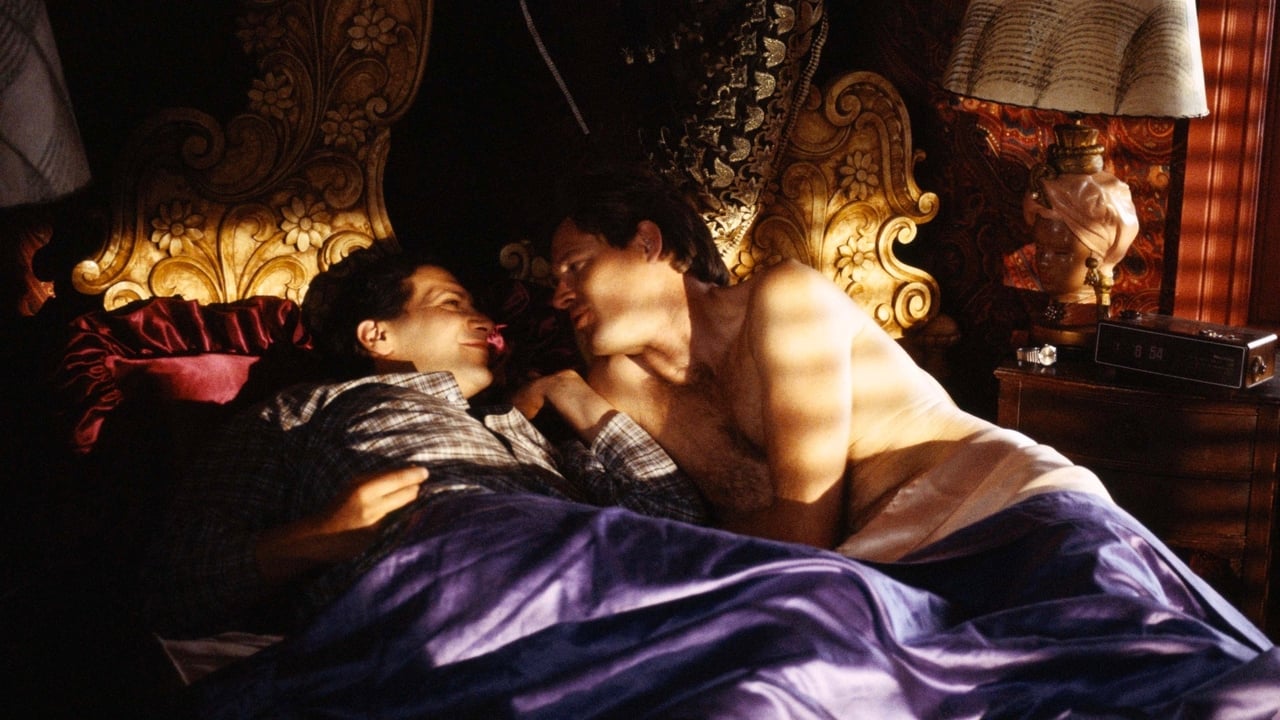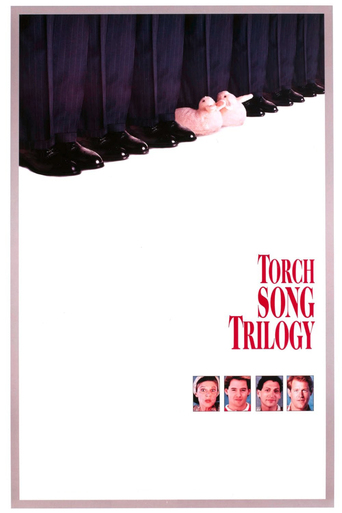



Slow pace in the most part of the movie.
It is a performances centric movie
How sad is this?
Charming and brutal
In the late 80s, Harvey Fierstein had his play, Torch Song Trilogy, adapted into a movie from New Line Cinema, which was generally well received by critics and audiences for its themes of homosexuality getting around in the 70s before it was fully accepted nationwide. While I have not seen the original play itself, I think the move to cinema works in favor of Fierstein's creation, mainly for how it brings a rather intense feel to the problems that homosexuals went through in New York prior to the AIDS epidemic, and I think they did quite a good job bringing it to the big screen.As this is a trilogy by title, the whole film centers around the life of a gay Jewish man named Arnold Beckoff (Fierstein) who refuses to conform to anyone else's ideas, even his uptight mother (Anne Bancroft). Considering that Arnold Beckoff found out he was gay at age thirteen, he chose to be a pretty successful drag entertainer to make amends with life. Along with the soon to be mentioned side archs, what's really interesting about the film is the contrast between Arnold and his relatives. Based on her generation, Ma Beckoff just thinks being gay is a phase, but by the time Arnold is in his mid thirties, it only disproves her point, causing some meaty drama between the two that really sells the feature. As the film showcases Arnold's career as a drag queen, we see that his love life is pretty tumultuous to say the least. The one true love of his life is a bisexual named Ed (Brian Kerwin) who doesn't really see himself as being homosexual. It's interesting when Arnold calls him out by saying he'd like to meet at least one bisexual who is open with his gaylife, but would rather keep his women a secret. This creates much chemistry and bickering between Arnold and Ed, as Arnold's love issues conflict with Ed failing to contain any deep values, making Ed more than just an unsophisticated "hayseed" who Arnold just cannot get behind.Later, after a disastrous performance, a young male model named Alan (Matthew Broderick) ends up falling for Arnold, and Broderick sells the same charismatic charm he displayed as Ferris Bueller. It's through their relationship that Arnold feels like he has found the next true love of his life, and one particular scene where they spend the night at Ed and Laurel's house (his former fiance), they fully persist their lovelife after jokingly testing it to the other two. It's only upon Alan's tragic death during a massive gang fight from a pack of homophobic street thugs that the film really brings an emotional gut-punch to the audience, let alone Arnold, and it's sad to say that events like these are not too uncommon today.The final arch in the film details Ma Beckoff visiting Arnold who is in shock when she discovers that he has planned legal adoption of a gay teenage son, David (Eddie Castrodad), leading to many arguments where Arnold demands that she accept him for who he is, going as far to say that she has no place in his life if she can't do so otherwise. I'm sure anyone who is part of the LGBT community can relate wholeheartedly, as such debates between a mother and offspring can resonate with people who suffer emotionally due to their place in society. While they do somewhat make up with one another, especially with Arnold's successful new career with his own stage revue, it makes him a much more complete man and we see just how coming to terms with one's parents never really works without drama.On a notable note, although far and few in between, the drag shows are very well choreographed, funny and even colorful, as director Paul Bogart and cinematographer Mikael Salomon fully display the raw energy and charisma found in the one stage performances. The makeup department also deserves much praise, as they really get the aesthetic and feel of drag queen material down and I'm sure they had a lot of fun putting it on the performers. In addition, Fierstein did co-write the song Dames, and it perfectly sets up the comedic tone that is displayed throughout the drag shows, giving some much needed humor in a very realistic film. All in all, Torch Song Trilogy transfers quite well from the stage to the screen, which could not have been done without Fierstein or Bogart's involvement. As it is a rather personal nostalgic project arguably based on his own gay male life, it details the general dilemmas of growing up gay at a time when it was yet to be accepted by most people. If you're interested in checking out a film that details the struggles of homosexuality or if you're into anything featuring Fierstein, then this is just the film for you. It's quite admirable how Fierstein has never even tried to undermine his dedication for LGBT rights while displaying his versatile talents to his people and everyone else in general. So, here's to more fun projects with the man who really knows how to connect with the flaws of society and minorities.
View MoreMovie follows the life and times of gay drag queen Arnold Berkoff (Harvey Feinstein) from 1971-1980. It goes into his dealings with bisexual Ed (Brian Kerwin), Ed's girlfriend Laurel (Karen Young), cute young model Alan (Matthew Broderick), his mother (Anne Bancroft) and an adopted gay son David (Eddie Castrodad).The original play was about 4 hours long so naturally a lot was left out of this adaptation. Still, the fact that this got made at all back in 1988 is amazing. This was years before "Will & Grace" or "Queer As Folk". It came and went quickly but it should be rediscovered. The script is sharp and (for the most part) the acting is excellent. It deals realistically with a gay man trying to deal with family, love, men and relationships in the 1970s--but I think any gay man from any era could find plenty to identify with here. Fierstein is excellent in his Tony Award winning role. His voice is a little hard to take at first but you get used to it. Kerwin seems a bit too earnest as Ed but he's still pretty good. Broderick seems nervous too but he pulls off the role of Alan (although seeing him falling all over Fierstein IS pushing credibility). As a point of interest Broderick played David in the original stage version and said it helped his career quite a bit. Young is very good in her small role as Laurel and so is Ken Page in his small role as Murray. Bancroft is WAY over the top as Arnold's mother (but it fits the role) and Castrodad does what he can with his severely edited role as David. However his first meeting with Bancroft is hilarious. Also there's some beautiful direction here--a shot from up above NY after Arnold meets Ed always takes my breath away. Funny, smart, sweet, touching and sad--a very good movie. The two hours just fly by. WELL worth seeing. A 9.
View MoreThere are so many touching scenes in this movie, both funny and tearful. It's wildly unfair to characterize it as a "gay" film as though gays are the only people who'll love this film and want to own a copy.It never fails to make me cry in the first 5 minutes. How many films do that for you? ...And it has the good sense to balance that crying with laughter moments later.The bunny slippers... oh, God, the bunny slippers in the school...! Trust me, you'll laugh till your breath doesn't know whether to come in or go out.It was a little distracting to have Matthew Broderick in one of the lead roles, because he was a star when the film came out. I kept seeing Matthew Broderick the star, not his character (through no fault of his acting). Maybe if the hairstyle and makeup had been radically out of character for him....? Meh. Historically, though, I understand the necessity: his first big break was in another role in the Broadway play, and this was payback.The script is almost as clever as a Douglas Adams book or Neil Simon play, yet deals with far stronger emotional topics: family love, romantic love, light friendship, loss, dignity, respect, and self-loathing. It's deeply, deeply involving without being heavy-handed, and comedic without being insulting to the audience.Even the smaller roles are perfectly cast and well written: Alan's large black friend, Anne Bankroft as the mother, Ed the lukewarm conflicted lover, and Ed's wife were particularly memorable. Likewise, even the small elements of set dressing and stage direction are endearing.People who like "Crossing Delancey" and "Sense and Sensibility" will love this film, and watch it at least once a year. It's got an industry slot on my "often watched films" shelf.
View MoreIneffective, miscast, and curiously awkward comedy-drama about a gay drag queen's search for true love. Harvey Fierstein adapted his stage triumph for the screen and has the leading role, but Fierstein (who has proved to be a great character actor in showy supporting roles) isn't quite able to carry off a lead, at least not on film. On-screen almost constantly, his sandpaper voice breaking up in mock-happiness or despair, he's too needy, too unsure of himself, and he takes visual and verbal short-cuts to emotions without taking the audience's sense of rhythm into consideration (he's always two steps ahead, beating us to the laughs and the pathos). As for his script, the dialogue has the unmistakable ring of late-night-movie clichés, and director Paul Bogart's comic timing is gummy and rehearsed. Anne Bancroft, a great actress, is miscast once again as Harvey's mother (she seldom found a role that suited her, particularly after "The Graduate"). Tidy, lackluster scenario is plastic and unconvincing, as are Matthew Broderick and Brian Kerwin as Fierstein's lovers. It's a harmless sitcom...and what a shame that is. ** from ****
View More